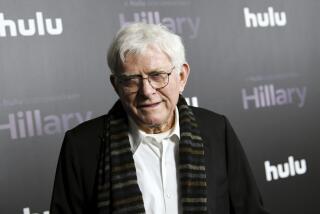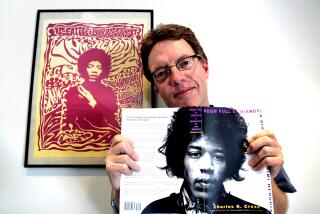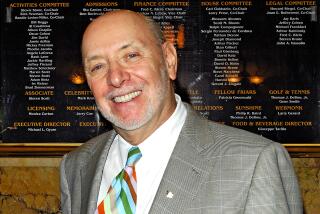Jean Shepherd; Radio Humorist, Author
Jean Shepherd, the prolific radio raconteur whose easy storytelling style earned comparisons to Mark Twain, died Saturday. He was 78.
Shepherd died in a hospital near his home on Sanibel Island, Fla., said his longtime friend and business advisor, Irwin Zwilling.
In his 21 years on 50,000-watt WOR-AM in New York City, Shepherd attracted a large and loyal following along the Eastern Seaboard. Shepherd could weave tales and develop a mood like no other and kept his audience hovering near their radios. He worked without a script and conjured tales based on his Indiana upbringing, creating such characters as his alter ego, Ralph Parker, and his neighbors, the Bumpuses.
He would talk about whatever came to mind, and those tales often celebrated the hopelessness and haplessness of the human race and the total absurdity of life on Earth.
“Most people think of life as some kind of never-ending struggle, a tragedy,” he once said. “To me, life is a vast, cosmic, shaggy dog story, a giant, curiously unresolved joke with an infinitely long punch line.”
Shepherd was more than a radio performer. He wrote and narrated the 1983 classic “A Christmas Story,” a sardonic look at the holiday. His writing appeared in a vast assortment of publications, from Playboy, where he was a frequent contributor, to Car and Driver and National Lampoon. He wrote several books, including 1966’s “In God We Trust, All Others Pay Cash,” which had 10 printings, and the 1971 story collection “Wanda Hickey’s Night of Golden Memories and Other Disasters.”
Shepherd did a pair of syndicated PBS TV programs, “Jean Shepherd’s America,” a highly personalized guided tour of the United States that ran in 1971 and 1972, and “Shepherd’s Pie,” more tales from the American road, which appeared in 1985.
Born in Chicago, where his father was an office manager for Borden Dairies, Shepherd grew up in nearby Hammond, Ind. Hammond was a “tough and mean” industrial city, Shepherd later said, and he used it in his stories. He changed the name to “Hohman,” and it came to represent all of the major industrial towns in the Midwest.
As an adolescent, Shepherd worked as a mail boy in a steel mill. He began his radio career at the age of 16, doing weekly sportscasts for a radio station in Hammond. That job led to juvenile roles on network radio in Chicago, including that of Billy Fairchild in the serial “Jack Armstrong, the All American Boy.”
During World War II, Shepherd served in the U.S. Army Signal Corps, installing radar equipment and developing a dislike for authority figures.
After the war, he studied acting in Chicago at the Goodman Theatre and engineering and psychology at Indiana University. He left Indiana without a degree to take a radio job in Cincinnati, which led him to a series of radio jobs, each better than the previous.
While he was hosting a late-night television show he came to the attention of Steve Allen, the original host of “The Tonight Show.” Allen was about to leave “The Tonight Show” and recommended Shepherd as his replacement, but the NBC job never worked out for Shepherd. What did work out was a job at station WOR-AM, where he stayed for the next 21 years.
The irreverent Shepherd was continually in trouble with station management. He was suspended after plugging Sweetheart soap, which was not a sponsor, but the ban was lifted by the station after his fans held protest rallies and the soap company, grateful for the publicity, signed on as a sponsor.
Shepherd once exhorted his listeners to go to their local bookstores and demand the book “I Libertine.” The book, however, existed only in Shepherd’s mind. He also urged listeners to “hurl invective” whenever possible.
The latter ploy, which was widely believed to have inspired the climactic scene in Paddy Chayefsky’s 1976 film “Network,” had Shepherd telling listeners to put their radios in the window and inundate “the entire eastern half of the United States” with such shouts as “Excelsior, you fatheads!” and “OK, drop the tools, we’ve got you covered.”
After his career came to a close, Shepherd generally stayed out of the public eye. A man of diverse interests, he was a photographer, a pencil and ink artist, an amateur radio operator, a collector of 19th century religious art, an expert at a wide range of gadgetry, a private pilot and a sports car buff.
Shepherd’s third wife, Leigh, died last year after 21 years of marriage. The couple had no children, and there were no survivors, Zwilling said.
To Shepherd, humor was a disposition rather than a simple line.
“Comedy sets up lines; humor is an attitude, and much harder to sustain,” he once told a reporter.
“When you’re doing humor . . . the life you’re leading is the joke.”
More to Read
Start your day right
Sign up for Essential California for the L.A. Times biggest news, features and recommendations in your inbox six days a week.
You may occasionally receive promotional content from the Los Angeles Times.






